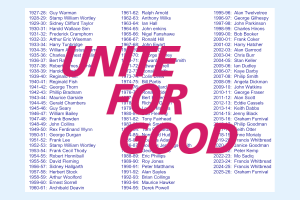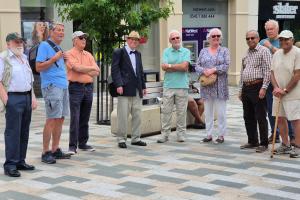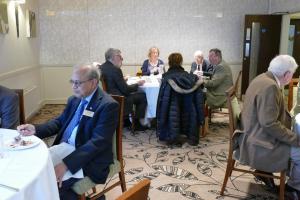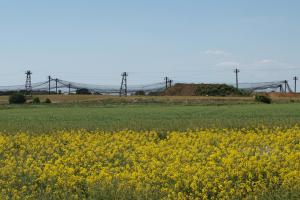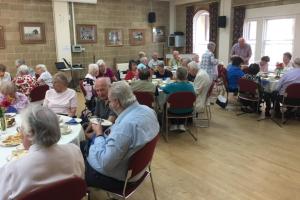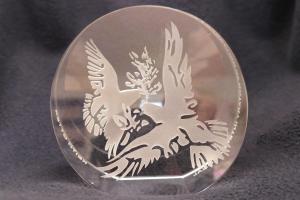Oliver Furnival: Living in Japan
Thu, Aug 21st 2025 at 12:45 pm - 2:15 pm
(At the Ivy Hill Hotel.) What is it like in this fascinating country?

 There were thirteen of us at today’s meeting. For the first time the ivy Hill Hotel gave us a single long table. It worked reasonably well for that number, although it is easier for people to talk together when we have round tables.
There were thirteen of us at today’s meeting. For the first time the ivy Hill Hotel gave us a single long table. It worked reasonably well for that number, although it is easier for people to talk together when we have round tables.
Our speaker was President Graham’s middle son, Oliver Furnival. We were joined by PDG Keith Brownlie and his wife Carol, who are going on holiday to Japan soon and were therefore interested in what Oliver had to say about living there.
When Oliver was growing up the family lived next door to a Japanese family. After leaving school he spent a year there before returning to England to qualify as a teacher. He met his Japanese wife there.
She joined him in England. Oliver spent eleven years here teaching at the Anglo European school, where pupils study for the International Baccalaureate.
He and his wife then returned to Japan, where they have lived for around twenty years. They have made their home in Kamakura, a small coastal city some 35 miles from Tokyo and at one time the country’s capital. They have a daughter, who is living in Chelmer Village and working as a social worker, and a son, who is about to start university in Japan.
Oliver is now Head of the International Baccalaureate Division of a private school in Kamakura. The school caters for all years of formal education from kindergarten to universido. The Japanese are keen on good education, starting to think about university when their children are still at kindergarten. One of the questions parents of potential pupils ask is “What university to your students go to?” They want their children to go to one of the top-flight universities but the Kamakura university is not at that level.
Religion is important in Japan. Kamakura is famous for its Bhuddist temples and Shinto shriens. Oliver said he avoids driving into central Kamakura at weekends because of the number of visitors. In contrast to the Abrahamic religions, the Bhuddists and Shinto have no regular pattern of services. Instead people attend when they wish to and may sometimes visit Bhuddist temples and sometimes visit Shinto shrines.
In Japan you are expected to take your shoes off and don slippers when entering a building. Areas are set aside where visitors can deposit their shoes. Oliver said that he felt strange standing inside the Ivy Hill Hotel still wearing his shoes.
Another custom that will seem strange to western visitors is that no one talks on public transport. There are even signs at train stations telling passengers to put their phones on silent before boarding. Passengers do really get pushed on to the commuter trains.
Japan has the same seasons as we do. Oliver advised us against visiting during Cherry Blossom time as prices are increased then. The cherry blossom looks spectacular but only lasts a couple of weeks; he much prefers the Azaleas, which are in flower much longer.
Keith Brownlie asked about the exchange rate with the yen. it is currently ¥198 to the puound. Oliver commented that, when he pays for something here, he mentally multiplies the cost by 200. He was taken aback recently to realise he had paid the equivalent of ¥4,000 for a breakfast which in Japan would have cost him ¥750.
'What We Do' Main Pages:
